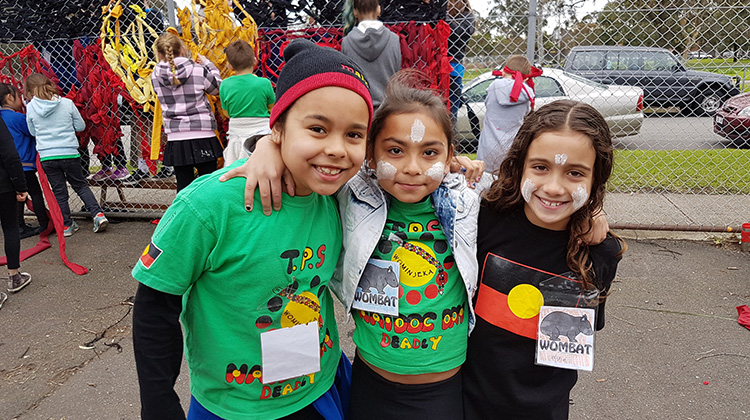How a Young Doctors Program is Changing School Attendance - and Lives

The idea of young people being ‘doctors’ is deeply embedded in Indigenous culture and life. For thousands of years, the Ngangkari - the traditional Aboriginal healers in Central Australia - have passed on their skills to young children.
This concept is the foundation of Malpa’s Young Doctors for Life Project, which teaches the traditional ways of healing using traditional knowledge keepers and Aboriginal Elders alongside modern ways of creating healthy communities.
Malpa works with respected community leaders to build knowledge of old and new health practices, while strengthening self-esteem and leadership skills in the Young Doctors. The unique, culturally derived, grassroots health program equips young primary school children with the knowledge and confidence to make informed life choices, to share their knowledge with their own communities and to aspire towards careers in health-related fields.
The program begins by asking local communities: “What do you think your kids need to know to lead strong, healthy and long lives?” and explores how Malpa’s Young Doctors for Life Project can support local people as they develop the program to meet the unique needs of their community.
The two leaders involve many experts through visits to schools from people such as Elders and community members, western doctors, nurses, ambulance paramedics, dentists and nutritionists - whoever holds the knowledge that will empower the Young Doctors.
Over the course of the 15-week program, the Young Doctors - all in Grades 3 and 4 or Grades 5 and 6 - visit a wide range of places, such as Aboriginal Medical Services, hospitals, food markets, the bush or pharmacies.
Lesson content begins with big picture ideas such as looking after our bodies and minds, looking after country and community and is then broken down into topics such as nutrition, hygiene, environmental health, wellbeing and identity, health literacy and leadership.
Throughout the program, the Young Doctors are taught about important topics such as affordable healthy foods, understanding food labels, and learning about the healthy food pyramid. Using the $20 Malpa MasterChef family meal challenge, for example, the Young Doctors are encouraged to discover healthy recipes, shop for ingredients and then cook a meal that they take home to the family. They share recipes with families, show them a supermarket recipe site and help with future meal preparation.
The program also helps young people build self-confidence and resilience by helping them recognise that they can be in control of many aspects of their lives: their emotions, their reactions, the way they treat others, and the choices they make.
Equipped with and inspired by this knowledge, the Young Doctors then share it with their friends and family, often bringing about change in areas such as hygiene, nutrition and environmental health.So, they fulfil their role as health ambassadors.
Malpa isn’t afraid to push the bounds of how far it can take the Young Doctors, all the while being careful not to cause a sense of overwhelm. Many of the Young Doctors have lived a life defined by trauma and we recognise that effective learning can’t take place under these circumstances.
The aim of each session is to begin by creating a comfortable, safe space and when the kids feel secure and relaxed, introduce the learning activities for the day. Each session has a wrap-up at the end, bringing the Young Doctors back into a calm and reflective space before heading back to join the rest of the school.
The results of the program speak for themselves: within the 2500 children who have gone through Malpa’s 15-week program to date, school attendance has risen an incredible 87- 98%, with 98% reporting feeling happy to come to school since becoming Young Doctors.
After completing the program, 100% of participants report actively thinking about working in a job after completing school, while 99% were able to identify one to three people within their community to ask about healing - from Elders to parents, health professionals or teachers.
Delivered in schools across NSW, ACT, NT, SA, and Victoria, the Young Doctors Project has the power to not only increase attendance, but strengthen self-esteem and leadership skills in children, improve health literacy and increase confidence, and build a long-lasting connection to culture.